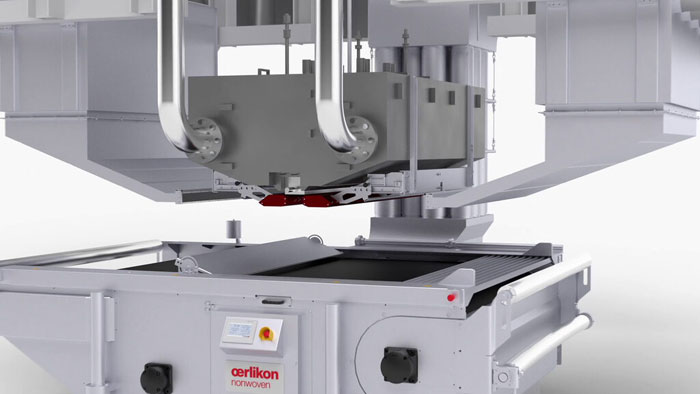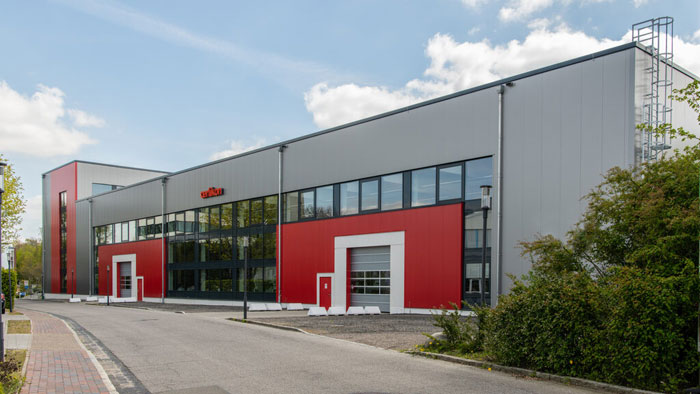
Oerlikon To Present Sustainable Solutions For Road Safety At Techtextil
At this year’s Techtextil, Oerlikon Polymer Processing Solutions will be presenting the trade audience with new applications, special processes and sustainable solutions focusing on the production of industrial textiles. Among other things, the company will be showcasing new technology for charging nonwovens that sets new standards with regards to quality and efficiency. Between June 21 and 24, the discussions in Hall 12.0, Stand C60 will be concentrating on airbags, seat belts, tire cord, geotextiles, filter nonwovens and their diverse applications.
More polyester for airbags
Airbags have become an integral part of our everyday automotive lives. The yarns used in them are made predominantly from polyamide. As a result of increasingly diverse airbag applications and also the increasing size of the systems used, polyester is today used as well, depending on the application requirements and cost-benefit considerations.
Against this background, the Oerlikon Barmag technologies make an invaluable contribution. In addition to high productivity and low energy consumption, they particularly excel in terms of their stable production processes. Furthermore, they comply with every high quality standard for airbags, which – as in the case of virtually all other textile products used in vehicle construction – must provide the highest level of safety for vehicle occupants. And all this without any loss of function in any climate and anywhere in the world for the life-time of the vehicle.
Buckle up!
Seat belts play a decisive role in protecting vehicle occupants. They have to withstand tensile forces in excess of three tons and simultaneously stretch in a controlled manner in emergencies in order to reduce the load in the event of impact. A seat belt comprises approximately 300 filament yarns, whose individual, high-tenacity yarn threads are spun from around 100 individual filaments.
“With our unique, patented Single Filament Layer Technology, we offer a sophisticated and simultaneously gentle high-tenacity (HT) yarn process for manufacturing these lifesavers and other applications made from industrial yarn”, explains Dr. Roy Dolmans, Technology Manager IDY and R&D Filament Processing.
Invisible, but essential – road reinforcement using geotextiles
But it not just inside vehicles, but also under them, that industrial yarns reveal their strengths. Low stretch, ultra-high tenacity, high rigidity – industrial yarns offer outstanding properties for the demanding tasks carried out by geotextiles; for instance, as geogrids in the base course system under asphalt. Normally, geotextiles have extremely high yarn titers of up to 24,000 denier. Oerlikon Barmag system concepts simultaneously manufacture three filament yarns of 6,000 denier each. Due to the high spinning titers, fewer yarns can be plied together to the required geo-yarn titer in a more cost- and energy-efficient manner.
hycuTEC – technological quantum leap for filter media
[caption id="attachment_24225" align="alignnone" width="700"] The hycuTEC process easily achieves filtration efficiencies in excess of 99.99% in the case of typical filter media.[/caption]
In the case of its hycuTEC hydro-charging solution, Oerlikon Neumag offers a new technology for charging nonwovens that increases filter efficiency to more than 99.99%. For meltblown producers, this means material savings of 30% with significantly superior filter performance. For end users, the consequence is noticeably improved comfort resulting from significantly reduced breathing resistance. With its considerably lower water and energy consumption, this new development is also a future-proof, sustainable technology.
New high-tech Staple Fiber Technology Center
Extending to around 2,100 m2, Oerlikon Neumag in Neumünster is home to one of the world’s largest staple fibre technology centres. As of now, these state-of-the-art staple fibre technologies are also available for customer-specific trials.
[caption id="attachment_24226" align="alignnone" width="700"]
The hycuTEC process easily achieves filtration efficiencies in excess of 99.99% in the case of typical filter media.[/caption]
In the case of its hycuTEC hydro-charging solution, Oerlikon Neumag offers a new technology for charging nonwovens that increases filter efficiency to more than 99.99%. For meltblown producers, this means material savings of 30% with significantly superior filter performance. For end users, the consequence is noticeably improved comfort resulting from significantly reduced breathing resistance. With its considerably lower water and energy consumption, this new development is also a future-proof, sustainable technology.
New high-tech Staple Fiber Technology Center
Extending to around 2,100 m2, Oerlikon Neumag in Neumünster is home to one of the world’s largest staple fibre technology centres. As of now, these state-of-the-art staple fibre technologies are also available for customer-specific trials.
[caption id="attachment_24226" align="alignnone" width="700"] The new Staple Fiber Technology Center in Neumünster - with around 2,100 m2 one of the largest in the world.[/caption]
The focus during the planning and the design of the Technology Center was on optimising components and processes. Here, special attention was paid to ensuring the process and production parameters in the Technology Center system could be simply and reliably transferred to production systems. “We are not only able to run all standard products available on the market at our Technology Center, it also offers us the perfect prerequisites for the development of new processes and products”, explains Tilman Reutter, Technology Manager - Head of Staple Fiber Process. Here, the fibre tape processing line is modular in design. All components can be combined with each other as required. And comprehensive set-up options supply detailed findings for the respective process for various fiber products.
The Technology Center is also equipped with two spinning positions for mono- and bi-component processes. The same round spin packs are used for both processes, characterised by excellent fibre quality and properties and meanwhile very successfully deployed in all Oerlikon Neumag production systems. Furthermore, the spinning plant is complemented by automation solutions such as spin pack scraper robots, for example. “In future, we will be able to focus more strongly on the special requirements of our customers in the development of our product lines”, comments Tilman Reutter.
The new Staple Fiber Technology Center in Neumünster - with around 2,100 m2 one of the largest in the world.[/caption]
The focus during the planning and the design of the Technology Center was on optimising components and processes. Here, special attention was paid to ensuring the process and production parameters in the Technology Center system could be simply and reliably transferred to production systems. “We are not only able to run all standard products available on the market at our Technology Center, it also offers us the perfect prerequisites for the development of new processes and products”, explains Tilman Reutter, Technology Manager - Head of Staple Fiber Process. Here, the fibre tape processing line is modular in design. All components can be combined with each other as required. And comprehensive set-up options supply detailed findings for the respective process for various fiber products.
The Technology Center is also equipped with two spinning positions for mono- and bi-component processes. The same round spin packs are used for both processes, characterised by excellent fibre quality and properties and meanwhile very successfully deployed in all Oerlikon Neumag production systems. Furthermore, the spinning plant is complemented by automation solutions such as spin pack scraper robots, for example. “In future, we will be able to focus more strongly on the special requirements of our customers in the development of our product lines”, comments Tilman Reutter.

Textile Excellence
If you wish to Subscribe to Textile Excellence Print Edition, kindly fill in the below form and we shall get back to you with details.












